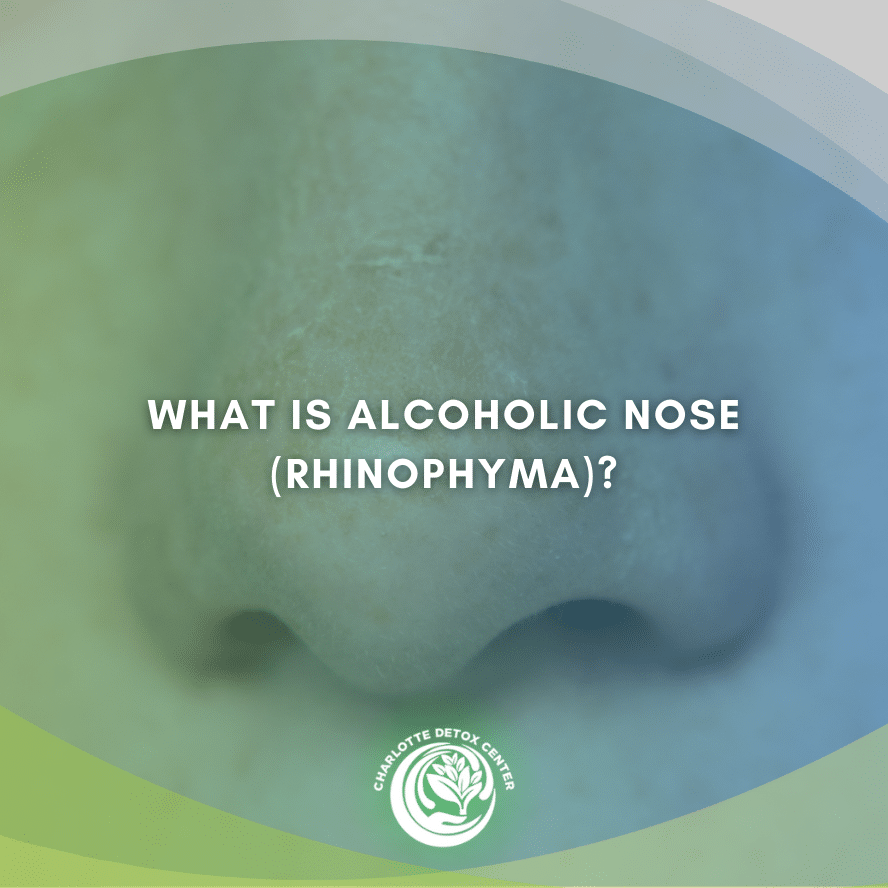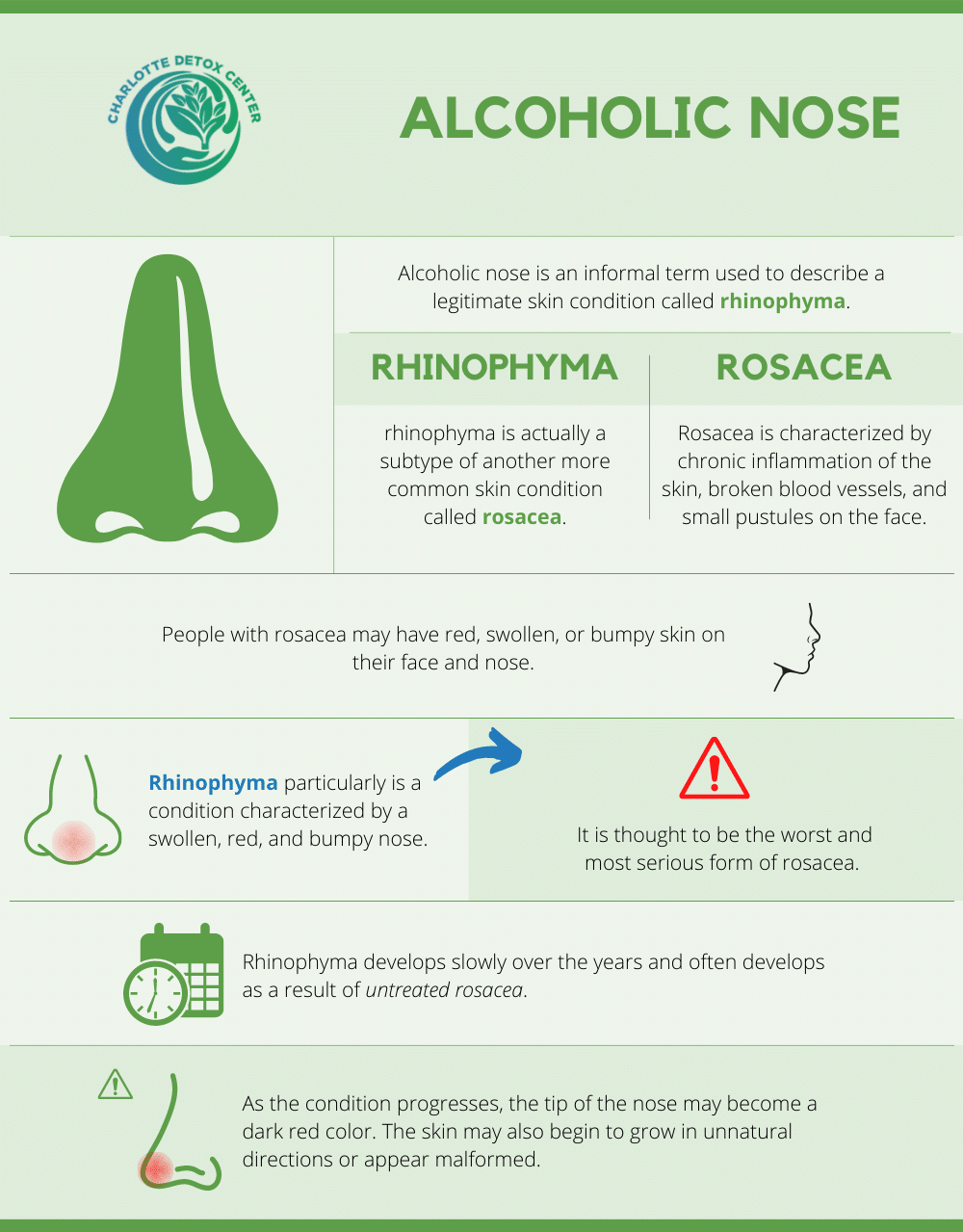What is Alcoholic Nose (Rhinophyma)?

Medically Verified: 2/1/24
Medical Reviewer
Chief Editor

All of the information on this page has been reviewed and verified by a certified addiction professional.
Alcohol, while legal to purchase for adults over the age of 21, is an extremely dangerous substance that usually causes more harm than good. People who abuse alcohol chronically may be susceptible to an array of serious health issues, ranging from cirrhosis of the liver to wet brain. However, another lesser-known side effect of long-term alcoholism is a condition called rhinophyma — also known as “alcoholic nose.”
In decades past, it was widely believed that alcohol consumption was the leading factor in the development of this condition. Today, we now know there is no proven relationship between alcohol abuse and rhinophyma. With that being said, dehydrating liquids like alcohol and caffeine are known to dilate blood vessels. As a result, alcohol abuse and alcoholism may make rhinophyma worse.
Understanding Alcoholic Nose

Alcoholic nose is an informal term used to describe a legitimate skin condition called rhinophyma. And, rhinophyma is actually a subtype of another more common skin condition called rosacea. Rosacea is characterized by chronic inflammation of the skin, broken blood vessels, and small pustules on the face. People with rosacea may have red, swollen, or bumpy skin on their face and nose.
Rhinophyma particularly is a condition characterized by a swollen, red, and bumpy nose. It is thought to be the worst and most serious form of rosacea. Rhinophyma develops slowly over the years and often develops as a result of untreated rosacea. As the condition progresses, the tip of the nose may become a dark red color. The skin may also begin to grow in unnatural directions or appear malformed.[1]
People with rhinophyma may experience additional symptoms, such as:
- Lumps on the nose
- Enlarged pores
- Thickened skin
- Scarring on the nose
- Red or purple discoloration
- Dry or oily skin
- Sensitive skin
- Flushed face
- Red patches on the nose
- Bumps that appear similar to pimples
- Visible blood vessels under the skin in the affected area
Both men and women can develop this condition, however, it is more common in men. It is also more common in people with fair skin or those with a family history of rosacea and other skin conditions. While the condition is not deadly, it can lead to embarrassment. Also, between 3-10% of patients with rhinophyma develop occult basal cell carcinoma.[2]
Why is Rhinophyma Called Alcoholic Nose?
Drinking alcohol produces many different side effects that may vary from one person to the next. One common side effect of alcohol intoxication is enlarged blood vessels that lead to redness or flushing on the skin, particularly in the face. As a result, people hypothesized that alcoholism or excessive drinking was the primary cause of rhinophyma – hence the name, alcoholic nose.
In 2015, however, a study conducted by the University of South Florida Morsani College of Medicine disproved the theory that rhinophyma is caused by alcoholism. Researchers found that there is no single cause for this condition. Instead, it develops as a result of many different factors.[2] Underlying risk factors for rhinophyma include:
- Rosacea – A minority of patients with severe rosacea go on to develop rhinophyma. In a study of 108 rosacea patients, 15 of them had the condition.
- Genetic predisposition – In families of English, Scandinavian, Eastern European, and Scottish descent, the risk of developing this condition increases if a family member also has the condition.
- Alcohol and caffeine intake – Alcohol and caffeine are thought to dilate blood vessels and may contribute to or worsen the so-called “alcoholic nose.”
The condition is also more common in middle-aged individuals 50 to 70 years old.
How Does Drinking Alcohol Affect Rhinophyma?
Even though alcoholism does not directly cause rosacea or rhinophyma, drinking alcohol can temporarily worsen the condition. It is normal for patients with rosacea to experience flare-ups while drinking alcohol or caffeine. This is because alcohol enlarges blood vessels in the body, causing blood to flow to the surface of the skin more easily. This is why people who are actively consuming alcohol often have a pink or red hue to their faces. While most people turn red or flushed while drinking, people with rhinophyma or rosacea may experience increased redness and irritation.
Fortunately, there are ways people with rosacea can prevent alcohol from worsening their condition or causing an alcoholic nose. Preventative measures to take include:
- Stop drinking alcohol altogether
- Drink in moderation
- Have a glass of water after every drink consumed
- Avoid cooking with alcohol
- Stay away from red wine because it may trigger flare-ups worse than other drinks
The Stigma Behind Labelling Rhinophyma as “Alcoholic Nose”
Despite what the name may imply, rhinophyma has nothing to do with how much or how often a person drinks. However, the term “alcoholic nose” causes the general public to associate this skin condition with alcoholism. As a result, people suffering from rhinophyma may feel embarrassed, annoyed, or ashamed because of their appearance. They may also fear being labeled an alcoholic. This may cause some individuals to avoid going out in public or meeting new people.
Individuals may end up increasing their alcohol intake to cope with the self-conscious feelings that come with having the condition. Of course, drinking more only makes the condition and the person’s mental health deteriorate even further. To prevent the stigma, it is important to recognize that alcohol does not cause rhinophyma and that the term “alcoholic nose” is nothing more than a misconception.
Find Help for Alcohol Abuse Today
More than 15 million men and women in the United States struggle with alcohol abuse.[3] Those who are affected require professional alcohol detox and treatment services to recover.
If you or someone you know is addicted to alcohol, our team at Charlotte Detox Center can help you take the first steps towards sobriety. Contact us today to get started.
References:
